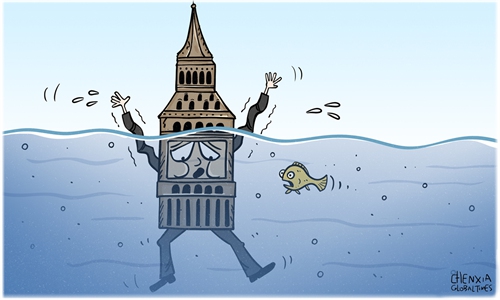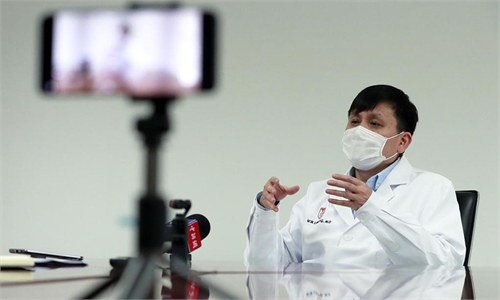COVID management downgrade adds new expectation to the world: Global Times editorial

Illustration: Chen Xia/GT
From Sunday, China starts managing COVID-19 with measures designed for combating Class B infectious diseases. On the same day, customs clearance at multiple ports has been officially resumed, and cross-border tourism, which had been suspended for three years, has been reopened. This was accompanied by a surge in air tickets and hotel searches and bookings, as well as the enthusiastic expectations for Chinese tourists by many countries. In China, with the continuous optimization of epidemic prevention and control measures recently, people have already felt obvious changes -- there are more vehicles on the streets, more people in restaurants and playgrounds, and crowds have been seen in consumer markets across the country. After three years of a difficult epidemic fight, we have finally won the strategic initiative of this "tough battle" and ushered in an important turning point.In order to realize smooth transition to Class B management, many optimization policy documents have been successively released recently. China's National Health Commission released the 10th edition of its diagnosis and treatment protocol for novel coronavirus infection as well as COVID-19 control protocol, which is echoing with the implementation of the 10 new measures in policy; it's emphasized early management in the epidemic prevention and control work; improve related work and medical treatment in rural areas; and the temporary payment policy for dedicated medicines used in treating COVID-19 covered by medical insurance will be extended. After shifting to Class B management, China's epidemic prevention and control has entered a new phase, with the focus of the work shifting from "infection prevention" to "health protection and severe cases prevention," and from risk areas and personnel control to health service and management.
The three years' epidemic fight has been tough and everyone has their own deep feelings. China is a big country with a large population, vast territory and uneven development among different regions. Such a family fact has decided that it will have multiple different tasks at different period. How to seek the greatest common denominator among various contradicting goals and realize the optimal solution for the collective interests of society has never been an easy single-choice question. In the past three years, it can be said that China has persisted its anti-virus fight until the variants have less virulence. It then adjusted the policy in accordance with the evolving situation, striving to achieve a difficult balance between epidemic prevention and control and economic and social development under new circumstances. This is in itself a firm practice of "people first, life first."
We have seen that cities that experienced the infection peak first have basically passed through smoothly, but many places are still facing the pressure of the epidemic. Though the most dangerous moment has passed, it is still far from the point where we can take a rest. Downgrading the management of COVID-19 from Class A to Class B doesn't mean no management. The shift means more refined services and guarantees and will raise the demand, rather than lower the demand for all aspects of work. It will test our wisdom, courage and adaptability even more. How to realize early management, moving forward focus, better ensure the implementation of the optimized measures in detail and comprehensively upgrade and prevention and control work and treatment capability is the top priority of the current anti-epidemic work.
With China staring to implement the Class B management of COVID-19, optimizing the management of personnel exchanges between China and foreign countries has also received great attention from the international community with rising expectation for economic rebound and increased people-to-people and cultural exchange. International public opinion all pointed out that China's reopening is good news, which will drive the recovery of the global tourism industry. Asian countries are particularly upbeat. Thai Public Health Minister Anutin Charnvirakul said recently that "This is an opportunity to restore our economic situation and recover from losses we suffered for nearly three years." The international public opinion generally believes that China, which keeps optimizing its epidemic prevention and control measures, will become the biggest driving force for global economic growth.
In recent days, the twists and turns regarding election of the US House speaker has once again exposed the polarization and division of US' domestic politics, and the following bipartisan game surrounding the presidential election will bring more uncertainties to the world. At the same time, the conflict between Russia and Ukraine shows no signs of easing, and there are still many uncertainties in regional stability. In this context, the significance of China's contribution to the global economy will become more prominent.
Since the outbreak of the epidemic, China's share of global merchandise exports increased from 13 percent in 2019 to 15 percent at the end of 2021, playing a key role as a "stabilizer" and "ballast stone" in the global supply chain. After Class B management is adopted, the flow of people and logistics will be further smoothed, and it will also bring more confidence to the development of the global economy.
The day before COVID-19 is managed as a Class B infectious disease, China's annual Spring Festival travel rush started. An estimated 2 billion trips will be made during the period, almost double last year's figure and 70 percent of 2019 levels. This should be the busiest New Year's Eve in three years. Countless people will embark on the road of reunion. Although there may still be difficulties on the road, it cannot stop people's firm determination to move forward together. Facts have proved that as long as we are united, there will be no obstacles we cannot overcome; as long as we persist, we will surely see the light of hope. It is this kind of consensus that allows us to build certainty amid uncertainty and gives us confidence in overcoming difficulties.



